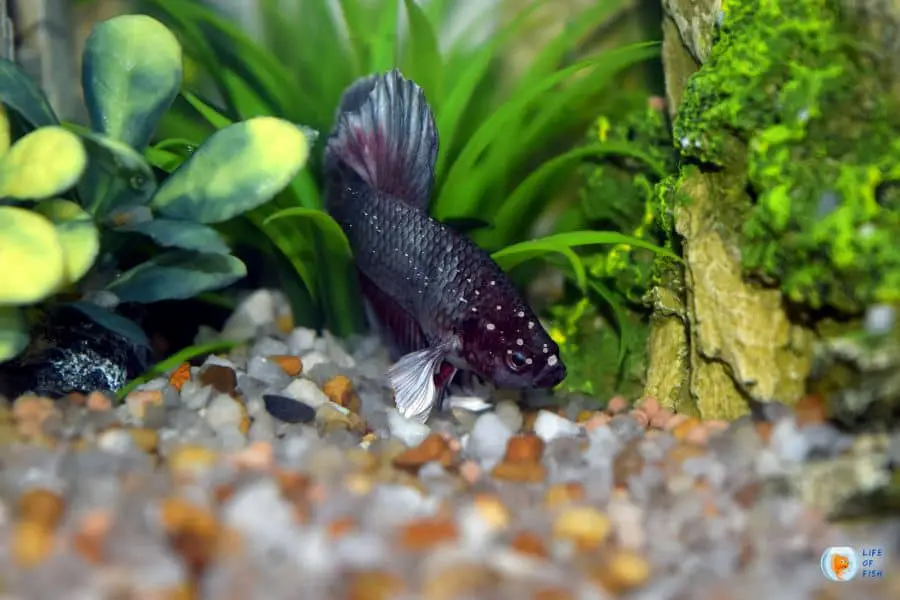Betta Ich Disease is a common ailment among Betta fish, and one that affects many aquariums across the globe. As betta fish lover I’ve seen my fair share of cases and have been able to successfully treat them with great success. In this article, I will be discussing what exactly Betta Ich Disease is, how it can affect your fish, as well as ways to prevent and treat it.

Betta Ich Disease is caused by a parasite known as Ichthyophthirius multifiliis (or simply “Ich”). This microscopic organism has the ability to attach itself to the skin or gills of a healthy betta fish. If left untreated, it can cause serious health issues such as fin rot and even death. Symptoms of infection include white spots on the fins or body, lethargy, loss of appetite, rapid breathing and scratching against objects in the tank.
Thankfully there are treatments available for Betta Ich Disease if spotted early enough. These range from chemical baths to raising water temperature which can help weaken the parasites before they spread further into the fish’s system. However prevention is still key when dealing with this disease. Thefore you should practice proper tank maintenance no matter what kind of aquarium you own!
“Don’t wait until it’s too late! Learn how to prevent and treat common Betta Fish Diseases by checking out our guide here.” Betta Fish Diseases
What Is An Ich?
Jump To
Ich is an absolute nightmare for betta fish owners! This parasite, also known as Ichthyophthirius multifiliis or ‘ich’, has been tormenting aquariums and ponds around the world since ancient times. It’s one of the most common diseases that affect tropical freshwater fish like the beloved betta.
This ich organism is a fungus-like parasite with a single-celled body structure that can cause severe tissue damage to affected fish. The causative agent in this case is a protozoan which makes it extremely contagious. In fact, if you did not maintain your tank, you’re likely going to see white spots on your fish very quickly.
Betta Ich Causes
Ich, or Ichthyophthirius multifiliis is one of the most common diseases that can affect betta fish. It’s an external parasite that causes white spots to form on their body and fins, leading to impaired swimming ability and appetite loss. As a result, it’s important to identify its cause in order to prevent it from occurring again in the future.
Can Ich Be Cured?
Yes, ich it is. Fortunately, there are several treatments available. Those can help your betta fish get rid of ich and return to its healthy state. The most common treatment is the use of medication in aquarium water. This method requires you to purchase a special medicine designed specifically for curing ich. And following the instructions carefully when administering it into the tank.
Another option is providing a freshwater dip with salt or other medications added in order to reduce the number of parasites on your betta’s body. You should only use this method if your fish has mild symptoms. Otherwise, it could cause stress and further weaken an already compromised immune system. If you decide to go down this route, make sure you have all of the necessary supplies ready before beginning the process. And watch closely while dipping so you don’t harm your fish in any way.
With proper care, patience, and either one of these methods, your betta should eventually make a full recovery from ich infection and be back to their normal selves again soon enough! Of course, prevention is always better than cure. Therefore keeping up with routine maintenance such as regular water changes will reduce the chances of having another outbreak occur in the future. Now let’s move onto discussing some of the telltale signs that indicate your betta may have contracted ich disease…
Betta Ich Symptoms
It is important to learn the signs of betta ich so you can diagnose and treat it quickly. Ich, also known as white spot disease. It is caused by a parasite that attaches to the skin or gills of fish. It is one of the most common diseases in aquariums and ponds.
The telltale sign of ich are small white spots on your betta’s body and fins. These may look like salt grains but they will be slightly raised off the surface of the scales. Your fish may show other symptoms including lack of appetite, listlessness, rapid breathing, rubbing against objects in their tank and clamped fins. If left untreated, these symptoms can cause further complications. Such as secondary bacterial infections which can lead to more serious illnesses.
If you notice any of these signs in your betta, it’s best to start treating them for ich right away before it spreads throughout your tank. Early diagnosis and treatment are key for successful outcomes when dealing with this debilitating disease.
Be sure to pay close attention to your bettas health.If you see any abnormal behavior contact an experienced veterinarian immediately . Next we’ll discuss how exactly to treat betta ich so your beloved pet has a chance at recovery from this pesky illness.
Betta Ich Treatment
It is often thought that the only way to treat ich disease in betta fish is with medication, but this isn’t necessarily true. Medications are a viable option for treating ich. But there are other methods that can be effective at removing and preventing it. As an expert on betta fish health and wellbeing, I want to go over some of the more popular treatment options available.
Water changes
The first method of treating ich is by performing regular water changes. This helps keep the tank clean and free from any toxins or pollutants that could stress out your fish or weaken their immune system. Additionally, if you have access to saltwater aquariums, adding small amounts of marine salt will help reduce the risk of infection as well as help remove existing parasites present in the tank.
Raising water temperature
Secondly, raising the temperature of your tank will speed up the life cycle of Ich so it may clear up faster than normal. However, you should not do this without consulting a veterinarian first as it can cause severe harm to your fish if done improperly. Finally, you can use preventative care. Such as providing adequate nutrition and maintaining proper water quality. It also plays an important role when trying to protect your bettas from getting sick due to ich disease.
You can utilize these various treatment options along with regular checkups from a vet. In that way, you can effectively manage and even eliminate Ich from your home aquariums altogether.
Ich Life Stages
Now that you know about betta ich treatment, it’s important to understand the life cycle of Ich. This is a multi-stage process and different symptoms appear at each stage. Knowing these stages helps in understanding how to prevent, treat, and care for your betta fish with this disease.
- First infected fish releases tiny cysts called tomites into the water where they can survive up to five days.
- Then tomite attaches itself to healthy fish skin or gills and then develops into trophont. They are visible white spot on the body or fins of your fish.
- During this time, your betta will start experiencing irritation and other signs of distress
Treatment Steps
When treating ich, you should disrupt ich lifecycle stages in order for the infection to be eliminated. This can be done by increasing water temperature and cleaning out the tank. The recommended temperature range for betta fish with this disease is 86-90°F (30-32°C). At these temperatures, elevated levels of oxygen are also beneficial. Additionally, medication dosage should be increased during treatment as well.
It is important to use a combination of all these steps when attempting to treat ich effectively. Heat treatment combined with a thorough cleanout of the tank will disrupt the lifecycle stages and help rid your fish of this common ailment. With an appropriate medication dosage added into the mix, you can rest assured that your fish’s health will improve quickly. To move on from here, one must understand what type of medicine works best against ich…
Ich Medicine
The next step in treating betta ich disease is to use an appropriate ich medication. You should choose one that has been specifically formulated for the treatment of this type of fish ailment.
You should use ich medications according to the instructions on the package label. It’s also essential to make sure you are using a dose that is safe for your particular species of betta fish.
When administering the ich treatment medicine, it’s important to follow all safety precautions as directed by the manufacturer or veterinarian. This includes wearing protective clothing such as gloves and goggles while handling any chemicals.
Additionally, keep other tank inhabitants away from areas where the ich medication is being administered. That way they don’t become exposed to potentially hazardous substances. Once the medication has been applied, monitor your betta closely over several days for signs of improvement or worsening symptoms before deciding whether additional treatments may be necessary.
Prevention And Care
Preventing betta ich is the best way to protect your fish. Here are some tips and tricks for preventing this disease:
- Regularly clean out their tank, removing any uneaten food or waste that could be a source of infection.
- Keep their water temperature between 74-82 degrees Fahrenheit as cooler temperatures can weaken their immune system.
- Change at least 25% of the water weekly to keep it fresh and free from bacteria and parasites.
Once you have identified that your betta has ich, there are several steps you can take to care for them in order to strengthen their immune systems and fight off the disease. Here’s what you should do:
- Increase aeration in the tank so oxygen levels remain high which helps reduce stress on the fish.
- Provide them with regular treatments using aquarium salt, malachite green or other medications specifically designed for treating ich. Follow instructions carefully when administering these treatments.
- Feed your betta easy-to-digest foods like frozen brine shrimp or freeze-dried bloodworms while they recover from the illness.
By following these prevention strategies and providing appropriate care when needed, you’ll be able to successfully treat your betta’s ich infection and get them back into good health quickly!
Conclusion
Ich, also known as white spot disease, is a common problem among betta fish. It’s important to recognize the signs of ich and take steps to treat it quickly in order to prevent further complications and maintain the health of your beloved pet.
By understanding what causes this disease, recognizing its symptoms and following appropriate treatment plans, you can be sure that your betta will stay safe from harm. Preventive measures such as good water quality, regular tank maintenance and proper diet are essential for keeping your fish healthy and free from any potential diseases. Ich can often be prevented with these simple steps!
Treating ich can seem daunting at first but by taking one step at a time, I know that many of you out there have successfully fought off this nasty little parasite before. With careful observation, timely treatments and diligent cleaning practices, you’ll be able to keep your betta swimming happily without worry or fear of infection again – like a beautiful summer day without a cloud in sight!
As a betta fish enthusiast myself, I understand how difficult it can be when faced with a dreaded case of ich. But don’t despair; if treated correctly it doesn’t have to feel like an uphill battle! Treating ich is like painting a masterpiece – every color has its own purpose but all together they create something truly special: A happy and healthy betta who will bring joy into your life every single day.
Read Next: Defeating Betta Velvet Disease: The Ultimate Guide to Symptoms, Treatments and Prevention

